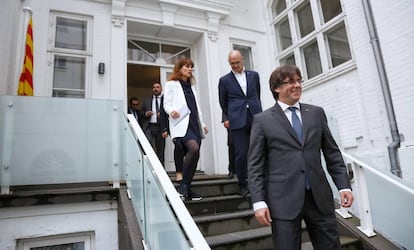Alarmed by foreign coverage of Catalan referendum, Spain steps up communication campaign
Madrid admits that it is lagging behind the Catalan government in its outreach to the media


The Spanish government has instructed its more than 120 ambassadors abroad to reach out to the media and do a better job of explaining the situation in Catalonia, where separatist officials are planning to hold an independence referendum on October 1 despite court rulings terming it illegal.
The Catalan conflict has made headlines across the world in recent months and most particularly in recent weeks
The Mariano Rajoy administration admits that it is losing the communication battle following a “brutal offensive” by pro-secession activists to sell their cause to the foreign media.
Madrid is less worried about the possibility that foreign governments might accept the October 1 vote as legal or binding. Rajoy, of the Popular Party (PP), on Friday expressed confidence that organizers of the ballot have no institutional backing outside Spain’s borders – not by national governments, not even by the United Nations.
But Spanish officials feel that many foreign news organizations, including a few very influential ones, have been mostly exposed to Catalan nationalists’ side of the story, and that this is being reflected in their coverage.
Spain’s main message – that secession and a unilaterally declared referendum are both unconstitutional and that the government thus has a legal obligation to halt them – has failed to take hold.
The Catalan government’s media outreach strategy is nothing new. For years, it has devoted extensive human and financial resources to putting out its message, appointing foreign affairs representatives, sponsoring foreign cultural events and targeting foreign correspondents in Spain.
Spanish officials say that international reporting on the issue occasionally includes erroneous or inaccurate statements
The Catalan conflict has made headlines across the world in recent months and most particularly in recent weeks, which have seen an accumulation of momentous events: the governing separatist coalition used its slim majority to ram two controversial pieces of legislation through the regional parliament in a procedure that skipped regular legal safeguards; Spanish prosecutors placed all Catalan mayors who pledged support for the referendum under investigation and threatened them with arrest; the Civil Guard was sent out to confiscate ballot-related material; and Catalan officials promised to ignore all court injunctions and go ahead with their vote regardless.
The escalating confrontation between Madrid and Barcelona has been covered by The New York Times, The Financial Times, The Washington Post, Le Monde and many others. Some of those news organizations have run editorials backing a negotiated solution to the crisis – an option that the Rajoy administration no longer sees feasible given the separatists’ unilateral declaration of a set date for their ballot.
But Spanish officials say that international reporting on the issue occasionally includes erroneous or inaccurate statements, and that when they have approached the news organization about publishing a correction, their recommendations have been largely ignored.
In July, Foreign Minister Alfonso Dastis met with the Op-Ed chief at The New York Times after this newspaper ran a story and an editorial that Spain found to be based on poor facts. Embassy sources say that apologies were issued. The Spanish ambassador to Washington, Pedro Morenés, sent in an article of his own, which was cut down and published as a letter to the editor. In it, Morenés described himself as “shocked by the lack of objectivity demonstrated in your newspaper, and the flagrant omission of facts that skews the reality of the situation.”
Meanwhile, Catalan officials have met with Madrid-based correspondents and with US lobbies with a view to getting their message out. The central government says that Catalan authorities have spent a significant amount of money on this international offensive, although it provided no documentary evidence to back up this claim.
With just two weeks to go before the planned referendum, the Spanish government has sent out a clear message to its own representatives abroad to “reinforce their presence” in the international media, and to do a better job of “explaining and observing.” Officials are being encouraged to multiply their own media presence.
English version by Susana Urra.
Tu suscripción se está usando en otro dispositivo
¿Quieres añadir otro usuario a tu suscripción?
Si continúas leyendo en este dispositivo, no se podrá leer en el otro.
FlechaTu suscripción se está usando en otro dispositivo y solo puedes acceder a EL PAÍS desde un dispositivo a la vez.
Si quieres compartir tu cuenta, cambia tu suscripción a la modalidad Premium, así podrás añadir otro usuario. Cada uno accederá con su propia cuenta de email, lo que os permitirá personalizar vuestra experiencia en EL PAÍS.
¿Tienes una suscripción de empresa? Accede aquí para contratar más cuentas.
En el caso de no saber quién está usando tu cuenta, te recomendamos cambiar tu contraseña aquí.
Si decides continuar compartiendo tu cuenta, este mensaje se mostrará en tu dispositivo y en el de la otra persona que está usando tu cuenta de forma indefinida, afectando a tu experiencia de lectura. Puedes consultar aquí los términos y condiciones de la suscripción digital.








































